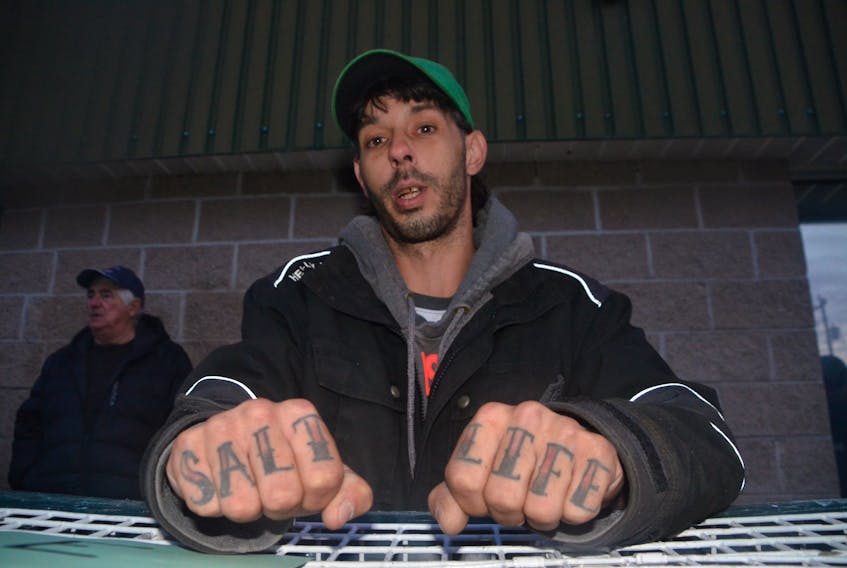In Monday’s predawn grey, Robert Atwood held a smoke between fingers tattoed to spell SALT and held his smartphone with ones reading LIFE.
From his phone, the 36-year-old read aloud a 21-year-old Supreme Court of Canada decision.
“The paramount regulatory objective is conservation and responsibility for it is placed squarely on the minister responsible and not on the aboriginal or non-aboriginal users of the resource,” reads the opening preamble of the Supreme Court clarification known as Marshall II.
“The regulatory authority extends to other compelling and substantial public objectives which may include economic and regional fairness, and recognition of the historical reliance upon, and participation in, the fishery by non-aboriginal groups. Aboriginal people are entitled to be consulted about limitations on the exercise of treaty and aboriginal rights.”
Atwood was one of over 200 fishermen who gathered at the Barrington Passage Fisheries and Oceans Canada office on Tuesday morning calling on their local member of parliament, federal Fisheries Minister Bernadette Jordan, to provide regulatory clarity on what a first nations moderate livelihood fishery looks like.

Jordan didn’t show up.
However, she did appear hours later on a virtual news conference with Crown-Indigenous Relations Minister Carolyn Bennett, Public Safety Minister Bill Blair and Indigenous Services Minister Marc Miller.
“Fishing is what should be bringing us together not tearing us apart,” said Jordan.
“To do that we need to have space, time and trust. We need to sit down and do what should have been done 250 years ago, we need to sit down and review fishery plans (with First Nations).”
Time, space and trust for her government’s handling of the crisis all appear to be in short supply of late.
As early as this spring, DFO was shopping around an offer that would see First Nations provided with more commercial fishing licences in exchange for putting off implementing moderate livelihood fisheries.

It echoed the agreements that saw Ottawa spending over $540 million to buy up hundreds of commercial licences and provide them, along with boats and training, to First Nations in Atlantic Canada.
While the Elsipogtog and Esgenoopetitj First Nations in New Brunswick accepted the deal, Nova Scotia’s Mi’kmaq did not.
Jordan, who has just now finished self-isolating in her South Shore home, did not answer questions about why she was not present in Nova Scotia for the beginning of the moderate livelihood fishery her department had known was coming for months.
She did say that because negotiations with Sipekne'katik are "nation to nation" there is no place for commercial fishermen's associations at the negotiating table.
She also said it wasn't for government to dictate to First Nations what constitutes a moderate livelihood.

Miller, the Indigenous services minister, stated during Monday’s news conference that the government now intends to uphold the Mi'kmaq's right to fish.
“The Mi’kmaq have a constitutional right to fish for a moderate livelihood; we will continue to uphold that right,”said Miller.
Despite his commitment, fisheries officers may have been hauling and seizing moderate livelihood traps in St. Peter’s Bay set by the self-regulated Potlotek First Nation as recently as last week.
“The use of approved tags is required to identify if lobster fishing activity has been validated within the (Food, social and ceremonial) and/or commercial communal licences issued by Fisheries and Oceans Canada,” reads a letter sent by Sherbrooke-based conservation and protection supervisor Matthew MacDonald to the Potlotek First Nation on Oct.9.
“… DFO requests your assistance to help in addressing this situation and direct the immediate removal of any traps that do not have an approved tag authorized by DFO.”

Potlotek’s fishermen were using their own tags issued by the band during a ceremony on Treaty Day (Oct. 1). They are part of the band’s moderate livelihood management plan that allows 50 traps per licence holder for a two month fall season. Licences are approved by the band council and their conservation measures, which are based upon those used in the commercial fishery, are enforced by their own staff.
“I don’t know who the hell has been doing it,” said Potlotek Chief Wilbert Marshall about his crews’ gear disappearing when contacted by The Chronicle Herald.
He refused to comment further.
Chief Mike Sack of the Sipekne’katik First Nation, however, said Sunday that DFO had seized Potlotek’s gear.
For its part, Fisheries and Oceans Canada didn’t provide a response by deadline.
There was more finger pointing to go around on Tuesday.

Miller called out the RCMP for failing to protect First Nations fishermen and their property. One lobster pound has been burned along with a van, another pound vandalized with moderate livelihood caught lobster discarded on the ground and Sipekne’katik chief Mike Sack assaulted over recent days.
“We must also recognize that once again, as evidenced by the scenes of violence, Indigenous people have been let down by the police, those who are sworn to protect them," said Miller.
"Throughout history, Indigenous peoples have experienced continuous discrimination and to this day still suffer the consequences of colonial practices, but they have shown an extreme resilience and courage in standing up for their rights."
But the head of the labour organization representing RCMP argued in an op-ed in The Chronicle Herald on Monday that the moderate livelihood crisis is the fault of the politicians.
“When our elected officials fail to find workable solutions and tensions boil over as a result, front-line RCMP members are given the extremely difficult and dangerous task of physically inserting themselves into political disputes, outnumbered and doing their best to keep participants and the public safe,” wrote Brian Sauve, president of the National Police Federation.
Among all the uncertainty, in the parking lot of his area DFO office, Atwood was mulling a million dollar question: Buy in?
Since his start, banding lobster on the deck of a Cape Islander at 16, he has worked his way up to first mate.
Buying the privilege to fish the resource managed by Jordan’s department will cost at least $800,000.
Add in a smallish used boat and gear and it’ll come to an easy million dollars.
The loan would require that he come up with a $95,000 down payment, then pay about $73,000 a year for the next two decades.
He really wants it.
But fishing is also a business and tying himself to a lifelong investment requires some regulatory certainty.
“I want to better myself, become a captain, have my own gear,” said Atwood.
“But I don’t know right now with all that’s going on.”









